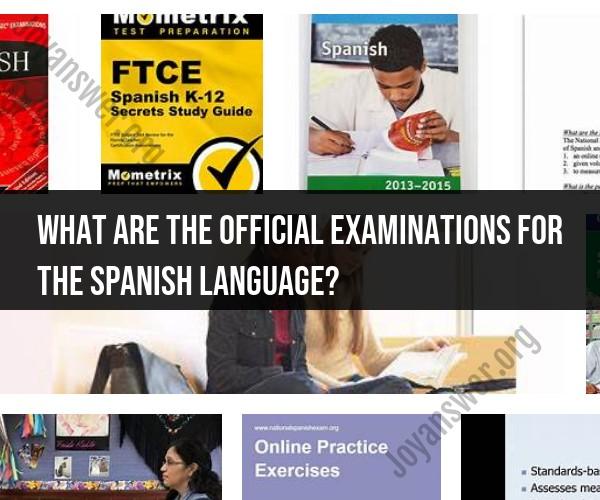What are the official examinations for the Spanish language?
Navigating official Spanish language examinations can be a significant step in assessing your proficiency in the Spanish language. These examinations are often recognized internationally and can be important for academic, professional, and personal purposes. Here's a comprehensive guide to help you navigate official Spanish language examinations:
1. Types of Spanish Language Examinations:
- DELE (Diplomas of Spanish as a Foreign Language): These are internationally recognized Spanish language proficiency examinations. They are offered by the Instituto Cervantes on behalf of the Spanish Ministry of Education. DELE exams assess different levels from A1 (beginner) to C2 (proficient).
- SIELE (Servicio Internacional de Evaluación de la Lengua Española): SIELE is a digital examination that assesses Spanish language proficiency for different language variants and cultures. It uses a point-based scoring system.
- CELU (Certificado de Español: Lengua y Uso): This examination is offered in Argentina and certifies your proficiency in Spanish for academic, personal, or professional purposes.
2. Purpose of Taking Official Examinations:
- Official Spanish language examinations are often required for admission to Spanish-speaking universities, for job applications, for immigration purposes, and for personal enrichment.
- They provide a standardized way to assess your language skills and demonstrate your proficiency to potential employers, educational institutions, or immigration authorities.
3. Choosing the Right Examination:
- Determine the purpose for which you're taking the examination. Different exams may be more suitable for academic, professional, or general purposes.
- Choose the appropriate level of examination based on your current proficiency in Spanish.
4. Registration and Preparation:
- Register for the examination well in advance of the test date. The registration process may involve selecting the exam level, location, and paying a fee.
- Prepare for the examination by studying grammar, vocabulary, reading, writing, listening, and speaking skills. There are various study resources, textbooks, and online courses available to help you prepare.
5. Test Format and Content:
- Familiarize yourself with the format and content of the examination. Different exams may have multiple sections covering reading, writing, listening, and speaking.
- Review sample test questions and practice tests provided by official examination websites.
6. Test Day:
- Arrive at the test center well ahead of the scheduled time.
- Bring the required identification, such as a passport or identification card, as well as any other materials specified by the examination guidelines.
7. Scoring and Results:
- Wait for the official results to be released. This can take several weeks after the examination.
- Examinations are typically scored on a scale that corresponds to the proficiency level being assessed (A1 to C2 for DELE, point-based scoring for SIELE, etc.).
8. Using the Certificate:
- Once you receive your certificate, you can use it for various purposes, such as applying to universities, presenting it to employers, or fulfilling immigration requirements.
9. Continuous Learning:
- Regardless of your examination results, continue practicing and improving your Spanish language skills. Learning a language is an ongoing process.
Remember that preparation and practice play a crucial role in performing well in these examinations. Utilize official study materials, take practice tests, and consider enrolling in language courses or working with language tutors to improve your skills. Each examination has its own specific guidelines, so be sure to visit the official website of the respective examination you're interested in for detailed information and resources.













